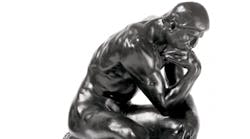Whether climate change, gun control legislation or some other hot topic, most of us believe we hold logical beliefs based on legitimate evidence. Technologists particularly pride themselves in being what philosophers have classed as "rationalists". Rationalism is the belief that truth is discovered primarily through reason. Gather information, grind through it in a logical process and you discover truth. Of course, you can't be just a brain on a stick. Whatever truth you discover and whatever predictions you make must at some point jibe with observations.
In my early college years, when I was so proud of knowing everything, I read a lot of Bertrand Russell's writings. Except for his bullheaded atheism, I agreed with much of what he said about finding truth. He was a rationalist. I thought I was a rationalist. In fact most of my school chums were what I'd call rationalists, apart from the beer and pizza. What thinking person wouldn't be?
Engineers and most scientists generally earn their living by following a rational process. We use accepted principles of physics, chemistry and other basic sciences. We logically apply these principles to the question at hand and come up with a common solution or prediction that can usually be verified. A New Zealand mechanical engineer comes up with similar answers as his/her counterpart in China.
But 'rationalism' doesn't lead to rational and consistent conclusions when applied to most of society's conundrums which are outside of the hard sciences. Folks that seem sane and logical, having access to identical information, regularly come to amazingly different conclusions when it comes to say, politics, macro-economics, global warming, theology, etc.
We're more divergent in our conclusions and belief systems than ever before, and getting more so. Why is that?
Here's the issue. If folks, with similar logic, used exactly the same information input, their conclusions would tend to converge or at least not diverge. But when we look at the information and assumptions that are available to stuff into our reasoning process, we find an almost unlimited supply, much of it conflicting and most of it of questionable accuracy. There's so much data out there that we have to choose subsets of information.
And how do we choose the information to use in our mental CPU?
We really have no choice but to select input based on our best judgment, our intuition (or often, emotions) – a process which usually leads to giving the most credibility to information that aligns with our existing beliefs. In turn, we become more entrenched in our existing stand and even pickier in finding information that we align with!
An engineer would call that a form of chaos, system instability caused by positive feedback.
Oh sure, many people say that they read everything so they can keep an open mind. Well, if you're reading conflicting opinions and information, you really can't use the information without giving more weight to some and less to others. The alternative is to truly have an 'open mind' and believe nothing at all.
At one time, newspapers and magazines had some editorial oversight and reporting was a profession, not a blogging hobby. There was a structure of accountability, but that began to come apart when the information hurricane began blowing with development of the Internet. Then it kicked up to category five with the metastasis of social media. Everybody's connected to everybody. Everybody is equal in credibility. Anybody can become a published expert on any topic.
And the trained and conscientious professional journalist is lucky to get a job folding sweaters at the mall.
But it gets worse. A recent Yale study showed that even when folks, proficient in understanding statistical data, are presented with the exact same data, their conclusions are biased by their political leanings. Liberals as well as conservatives and about equally. And it's not just the soft sciences that get distorted by subjective bias. Wherever there's room for human judgment there's seepage of political subjectivity. The chaos du jour being climate change (I don't even want to get started on that one).
Okay, so much for Bertram Russell. He worshipped man's reasoning. In fact, most of us do. That's the way we were taught. But, his philosophy is falling far short of levitating us to a higher intellectual or spiritual plain.
Another philosopher and theologian, Francis Schaefer, simplified things by saying (my very rough paraphrasing) that the biggest questions in life are: 1) Why is there something rather than nothing? 2) How do I relate to what is around me? And 3), the toughest one – what authority do I trust in answering the first two questions?
Get those questions settled in your mind and the rest of life falls into place, even without a Twitter account.


